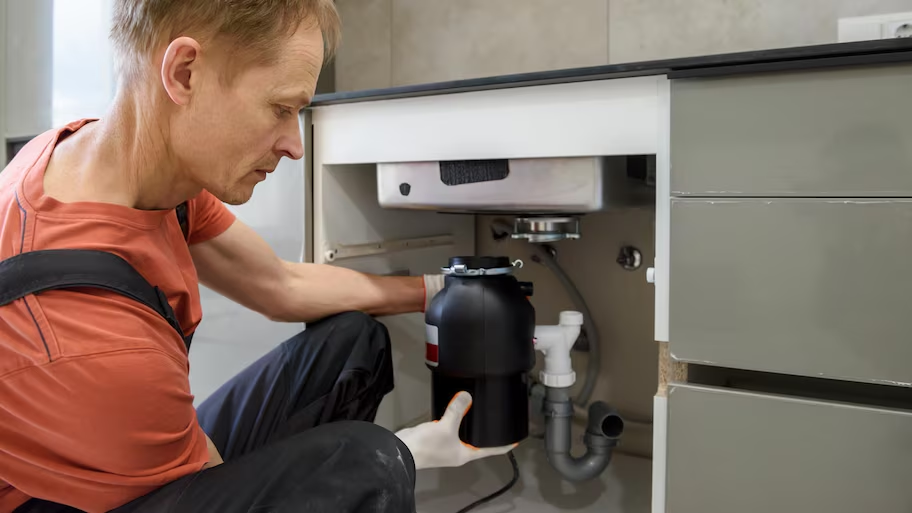Fast Fixes for a Dripping Garbage Disposal
Fast Fixes for a Dripping Garbage Disposal
Blog Article
This great article below on the subject of Why Is is absolutely captivating. Have a go and make your own personal conclusions.

Waste disposal unit are vital cooking area appliances that assist in getting rid of food waste successfully. Nevertheless, a leaking garbage disposal can be a frustrating and messy problem to manage. Fortunately, several leakages can be repaired conveniently with a couple of easy steps. In this short article, we will certainly talk about just how to take care of a dripping garbage disposal efficiently.
Intro
Waste disposal unit are installed under cooking area sinks and are developed to shred food waste right into smaller items, allowing it to pass through the plumbing system quickly. While these gadgets are typically trustworthy, leaks can occur in time as a result of damage, loose links, or damages to the unit.
Usual Reasons For Leakages in Garbage Disposals
Worn Seals and Gaskets
Seals and gaskets play a crucial duty in avoiding water from dripping out of the waste disposal unit. In time, these parts can degrade, leading to leakages around the disposal device.
Loose Links
The connections in between the waste disposal unit and the pipes system can end up being loosened gradually, creating water to leakage out during procedure.
Fractures or Openings in the Disposal Device
Physical damage to the garbage disposal, such as fractures or openings in the housing, can additionally lead to leaks.
Identifying the Source of the Leak
Prior to trying to fix a leaking waste disposal unit, it is essential to determine the resource of the leakage. This can usually be done through aesthetic examination or by performing straightforward examinations.
Visual Inspection
Check the garbage disposal system carefully for any type of indicators of water leak. Pay very close attention to areas around seals, gaskets, and connection factors.
Evaluating for Leaks
One way to examine for leaks is by running water through the disposal system and looking for any kind of noticeable indications of leakage.
Tools and Materials Needed for Repairing a Dripping Waste Disposal Unit
Before beginning the repair work process, gather the necessary devices and materials, including a screwdriver, adjustable wrench, plumber's putty, replacement seals or gaskets, and epoxy or patching material for fixing cracks or holes.
Step-by-Step Guide to Repairing a Leaking Waste Disposal Unit
Switch off the Power
Prior to attempting any kind of repair services, guarantee that the power to the waste disposal unit device is switched off to stop the risk of electrical shock.
Situate the Leakage
Determine the specific location of the leak and determine the reason.
Tighten Links
Make use of a wrench to tighten up any type of loosened connections in between the disposal unit and the plumbing system.
Change Seals or Gaskets
If the leakage is because of used seals or gaskets, eliminate the old elements and replace them with brand-new ones.
Patching Cracks or Openings
For cracks or openings in the disposal system, usage epoxy or a suitable patching material to secure the broken area.
Examining the Garbage Disposal After Fixing
As soon as the fixing is complete, examine the waste disposal unit by running water with it to make certain that the leak has been fixed.
Preventive Upkeep Tips to Avoid Future Leakages
To stop future leakages, it is essential to perform routine maintenance on your garbage disposal. This consists of keeping it tidy, avoiding putting non-food items or hard items down the disposal, and periodically looking for leaks or other problems.
Final thought
To conclude, dealing with a dripping waste disposal unit is a fairly straightforward procedure that can be finished with fundamental tools and materials. By following the steps detailed in this write-up and exercising precautionary upkeep, you can keep your waste disposal unit in good working condition and prevent expensive fixings in the future.
HERE’S HOW TO FIX YOUR GARBAGE DISPOSAL
WHAT TO DO IF SOMETHING IS STUCK IN YOUR GARBAGE DISPOSAL
If the impeller won’t turn, there’s probably something stuck in the disposal. It could be a steak bone or peach pit, although plumbers report pulling all sorts of inappropriate objects out of disposals, such as bottle caps or aluminum foil. Make sure power to the disposal is off, and look inside to see if you can see the source of the jam.
Never stick your fingers in a disposal. Pull out anything you see with tongs or pliers.
If the disposal still won’t work, it may be time to call a plumber or consider buying a new disposal. GEM Plumbing & Heating is here for all of your garbage disposal needs.
WHAT TO DO IF YOUR GARBAGE DISPOSAL DRAIN IS CLOGGED
Take everything out from underneath your sink and put a bucket or other container under your disposal to catch any water that drains out. Disconnect your disposal from the power supply. If it’s plugged into a wall outlet, unplug it. If it’s hardwired into an electrical box, go to the electrical panel and turn off the breaker for the disposal. Pour ¼ cup of baking soda into the drain, followed by ½ cup of white vinegar. Give the solution a few minutes to fizz and do its work. Look into the disposal with a flashlight to see if you can see an object that might be causing the clog. If you see it, remove it using tongs or pliers. MORE TIPS ON DEALING WITH A CLOGGED GARBAGE DISPOSAL
Never use drain cleaner in a garbage disposal. It can damage the plastic parts inside the disposal. You can also be splashed with the caustic liquid while working to clear the clog. Beware! Never stick your fingers into a garbage disposal. Trust us — not a good idea. In many instances, your dishwasher drains through your garbage disposal. This allows the disposal to grind any large food particles that may be drained out of your dishwasher. There are some jurisdictions, however, where the plumbing code prohibits such a connection. WHAT TO DO WHEN YOUR DISHWASHER DRAINS THROUGH THE DISPOSAL
Run some water in the sink so your plunger has at least a ½-inch of water to create a seal and plunge vigorously up and down several times. You may need to repeat this several times. Run hot water down the drain to clear any residue that remains.

I came across that page about Why Is while scouting around the internet. Appreciated our write-up? Please share it. Let other people find it. Many thanks for your time. Don't hesitate to check up our site back soon.
Call Today Report this page